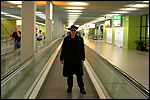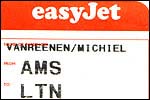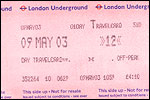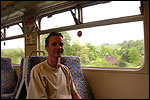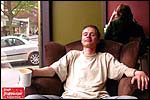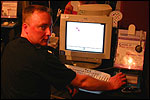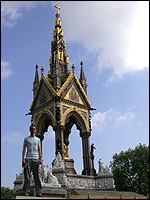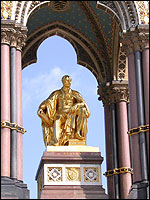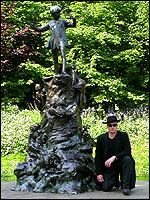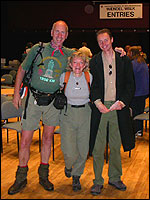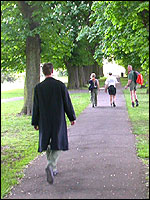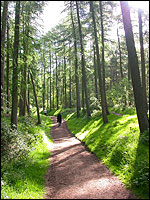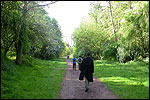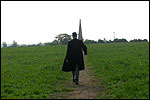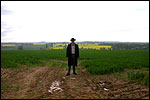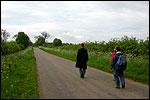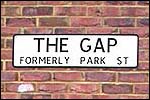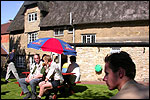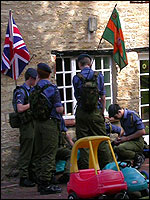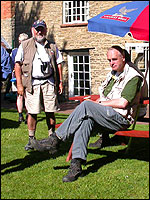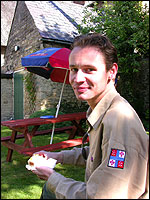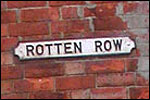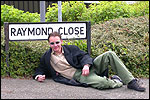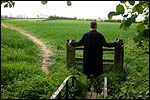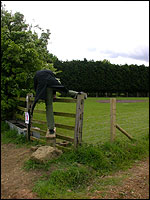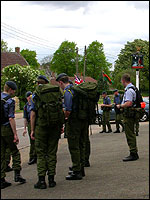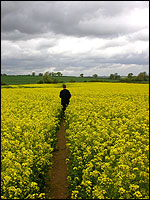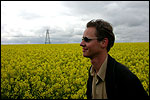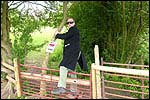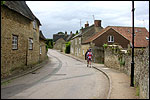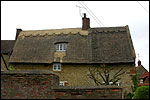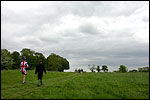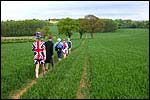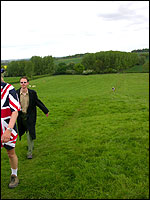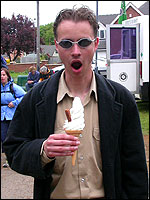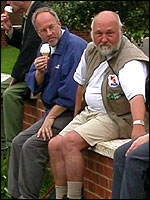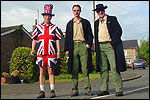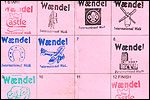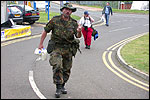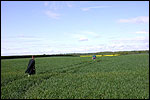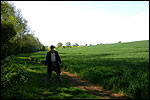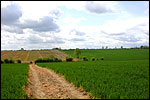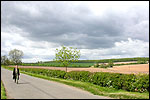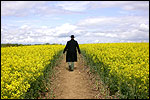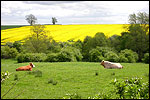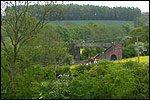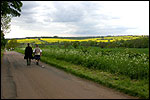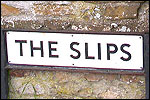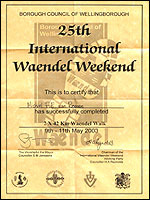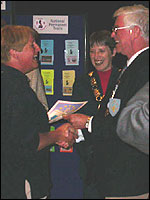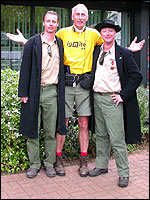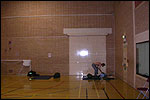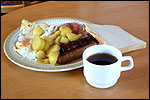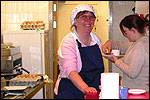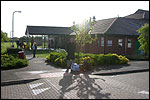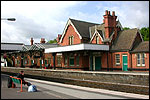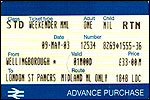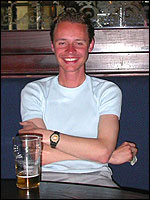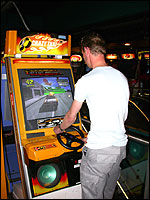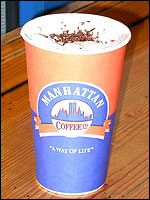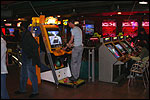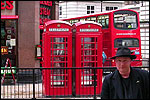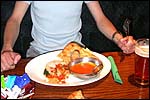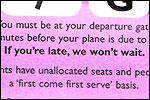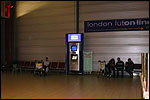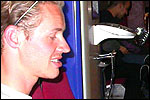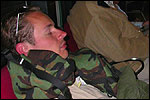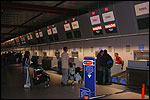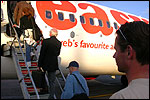| What are we doing?
May 13th, 2003 25th International Waendel Weekend Wellingborough 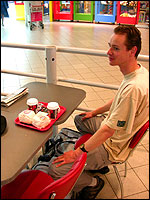 Mind if I make that a pound more? Well, yeah, I do, if it's all the same to you. Part 2 of my European tour, and the second march of the marching season 2003, began like part 1 ended: in the Burger King, at Schiphol Airport. Same table, even. Only this time I wasn't there with Marco van Zijntergen, but with Raymond de Gisser. Anglophile and former resident of London as he is, he absolutely was game to come along on this, probably the most expensive march of this year. See, that Greek does offer cheap fares, but not if you don't book way in advance. And so Ray and I had to pay around €145 for a return ticket to and from London Luton. That this would turn out to be an utterly reasonable price, compared to the rest of our financial agony, would only become apparent later. First, we had breakfast, of cheesefilled bagels, and bangblack coffee. Fine thing, the Burger King. Saviours, in dire need. Although it does make one gain pounds. Mind if I make that a pound more? Well, yeah, I do, if it's all the same to you. Part 2 of my European tour, and the second march of the marching season 2003, began like part 1 ended: in the Burger King, at Schiphol Airport. Same table, even. Only this time I wasn't there with Marco van Zijntergen, but with Raymond de Gisser. Anglophile and former resident of London as he is, he absolutely was game to come along on this, probably the most expensive march of this year. See, that Greek does offer cheap fares, but not if you don't book way in advance. And so Ray and I had to pay around €145 for a return ticket to and from London Luton. That this would turn out to be an utterly reasonable price, compared to the rest of our financial agony, would only become apparent later. First, we had breakfast, of cheesefilled bagels, and bangblack coffee. Fine thing, the Burger King. Saviours, in dire need. Although it does make one gain pounds.
Day 1 - The trip there 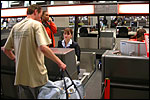 Good thing that, once on the far side, one loses those pounds quickly again. Which was, as said, not the fault of our EasyJet friends. No, this was, plainly and uncompromisingly, due to what befell us at Luton Airport. There, namely, we wanted, following some deliberation among ourselves, to acquire a train ticket that would get us to Bayswater. Having compared prices from memory, Ray and I namely concluded that my last used pad should be cheaper than his (which he had recently used with Neumann and Schelden). Bayswater it therefore was, where, in 1998, I had stayed for about 11 pounds a night. The ticket clerk on duty immediately took us for insane. "You going anywhere else, besides B-A-Y-S-W-A-T-E-R?!!!?" (evident horror audible in his voice). After which he explained to us that a single fare Luton-Bayswater would namely cost 11 pounds for the both of us, but a day pass for bus, train and underground in Greater London, Luton included, would only cost 8 pounds 20. Good thing that, once on the far side, one loses those pounds quickly again. Which was, as said, not the fault of our EasyJet friends. No, this was, plainly and uncompromisingly, due to what befell us at Luton Airport. There, namely, we wanted, following some deliberation among ourselves, to acquire a train ticket that would get us to Bayswater. Having compared prices from memory, Ray and I namely concluded that my last used pad should be cheaper than his (which he had recently used with Neumann and Schelden). Bayswater it therefore was, where, in 1998, I had stayed for about 11 pounds a night. The ticket clerk on duty immediately took us for insane. "You going anywhere else, besides B-A-Y-S-W-A-T-E-R?!!!?" (evident horror audible in his voice). After which he explained to us that a single fare Luton-Bayswater would namely cost 11 pounds for the both of us, but a day pass for bus, train and underground in Greater London, Luton included, would only cost 8 pounds 20.
This was worth it therefore, and naturally pleased us greatly, being thrifty (and soon-to-be penniless) Dutchmen, so no sooner said than done. Satisfied, but somewhat tense (trains in England, over the last few years, have had the tendency to derail at unexpected moments, with utterly deadly consequences, you see), we therefore took our seats in the Midland Mainline Express that took us to St. Pancras, from where we took the Tube (very pleasant: being a much plagued Dutchman in this, one immediately remembers that it ìs possible after all, this standing still on the right and moving on the left, of the escalator; in London, it even is just another of the rules in the official code of conduct), to B-a-y-s-w-a-t-e-r, where life is good. 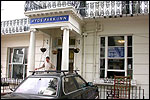 And it is, because Bayswater is a neighbourhood with a large diversity of nationalities, recognizable in both shops and restaurants, as well as the crowd in the street; because Bayswater is a relatively poor neighbourhood, making those shops and restaurants relatively affordable; because Bayswater nonetheless is a neighbourhood with stately mansions, with white façades and porticoes fitted with white pillars; because the cheap hotels dotting the area around, particularly, Inverness Terrace, are therefore pleasant places to stay; and because Bayswater is right next to Kensington Gardens. And it is, because Bayswater is a neighbourhood with a large diversity of nationalities, recognizable in both shops and restaurants, as well as the crowd in the street; because Bayswater is a relatively poor neighbourhood, making those shops and restaurants relatively affordable; because Bayswater nonetheless is a neighbourhood with stately mansions, with white façades and porticoes fitted with white pillars; because the cheap hotels dotting the area around, particularly, Inverness Terrace, are therefore pleasant places to stay; and because Bayswater is right next to Kensington Gardens.
So we contentedly booked a room in the Hyde Park Inn (confusing name, which earlier, in stories I told Raymond about my holiday of 1998, led me to mistake Kensington Park for Hyde Park, although, for formality's sake, I'll maintain that Kensington Park is part of Hyde Park, because they connect, one can walk from the one to the other without noticing one is leaving any park whatsoever, and Hyde Park is a lot larger than Kensington Park), and even got a six person room for the two of us, the only disadvantage being that it was on the top floor and therefore didn't have a balcony. Oh well, for 14 pounds a night this was a fine deal. 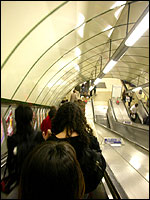 Pleasantly relieved from our luggage, we then seated ourselves in Starbucks along Queensway, drank coffee and ate sandwiches there, and feasted our eyes on the broads moving by our window. Nice, nice, nice. When, subsequently, we had visited Wandelsoc.nl in the basement, in order to use its link-list to end up on the site of the Waendelweekend in Wellingborough, so that we knew at what time we would have to take a train to where the next day, we were ready for the storming of London. Which began with a stroll through Bayswater, via Portobello Road and through Notting Hill to Ladbroke Grove. There we took the train to Camden, because I had never been there, and de Gisser remembered it as a nice neighbourhood. Pleasantly relieved from our luggage, we then seated ourselves in Starbucks along Queensway, drank coffee and ate sandwiches there, and feasted our eyes on the broads moving by our window. Nice, nice, nice. When, subsequently, we had visited Wandelsoc.nl in the basement, in order to use its link-list to end up on the site of the Waendelweekend in Wellingborough, so that we knew at what time we would have to take a train to where the next day, we were ready for the storming of London. Which began with a stroll through Bayswater, via Portobello Road and through Notting Hill to Ladbroke Grove. There we took the train to Camden, because I had never been there, and de Gisser remembered it as a nice neighbourhood.
Which it was. We had a great time there, in a pub (in which a pigeon that accidentally flew into the premises caused much hilarity), looked over the hundreds of stalls of the Streetmarket, and then suddenly finally found what I had been looking for for months now: a new, long, black, cashmere coat, to replace the old one, which after four years of loyal service was falling apart altogether. An utmostly Italian looking elderly gentleman (a Gepetto-like character with a broad nose and moustache), who actually turned out to come from Northern England (and who had also temporarily lived in Zoetermeer, to de Gisser's hilarity), sold it to me, for 95 quid, after I had let myself be ripped off by some Turk while exchanging euros, because he happened to man the only exchange office still open by this time of day. This, therefore, was a costly affair, which will however save me a lot of money in the long run - for where else would one find a coat like this for a price like that, when they usually go for around 600 euros, new, from the Hugo Bosses of this world? 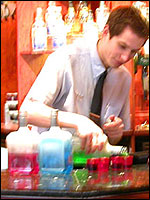 We ended the night around Russel Square, in the area where de Gisser once worked as a hotel doorman. More precisely, in The Goose & Granite, 31 Marchmont St., WC1N 1AP. An excellent pub, part of a chain like so many pubs (the 'Just So Pub Co.', in this case), a new phenomenon to me. Turns out not to do any harm. Although I must admit that by now (for we did return to this establishment later on in this story), I know that much of the pleasantness of our time here was caused by barman Toby's conduct. Barman Toby knows how it should be done, was at our side with suggestions for refills before we thought of them, remained utmostly attentive and courteous at all times, and made us forget a lot of time, in The Goose. Not in the least because he accepted even the weirdest orders without a trace of bewilderment. Like our double round of four AfterShock™s (made by Maxxium, which also produces Bols® liqueurs), horrid drinks, that come in three colours, blue ('Cool citrus', with mint taste), red ('Hot & cool', with cinnamon taste), and green ('Thermal bite', with anisette taste) and are served in semi-transparent red shotglasses. Barman Toby deserves a raise, we feel. Hips. We ended the night around Russel Square, in the area where de Gisser once worked as a hotel doorman. More precisely, in The Goose & Granite, 31 Marchmont St., WC1N 1AP. An excellent pub, part of a chain like so many pubs (the 'Just So Pub Co.', in this case), a new phenomenon to me. Turns out not to do any harm. Although I must admit that by now (for we did return to this establishment later on in this story), I know that much of the pleasantness of our time here was caused by barman Toby's conduct. Barman Toby knows how it should be done, was at our side with suggestions for refills before we thought of them, remained utmostly attentive and courteous at all times, and made us forget a lot of time, in The Goose. Not in the least because he accepted even the weirdest orders without a trace of bewilderment. Like our double round of four AfterShock™s (made by Maxxium, which also produces Bols® liqueurs), horrid drinks, that come in three colours, blue ('Cool citrus', with mint taste), red ('Hot & cool', with cinnamon taste), and green ('Thermal bite', with anisette taste) and are served in semi-transparent red shotglasses. Barman Toby deserves a raise, we feel. Hips.
Day 2 - London 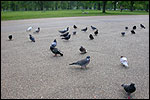 The next morning, using a socket in the hallway outside our room (in it, the sockets for some reason or other didn't work), I finally managed (don't, when going to England while being a Dutchman, forget to bring an adapter) to reload the two batteries of my digital camera, the last one of which had run out in The Goose the night before, we placed our luggage, which after all had to be removed from our room before 10 in the morning if we weren't going to occupy it for another night, in the hostel's storage (at £1,50 a day) and contentedly stepped out into a sunny London. The next morning, using a socket in the hallway outside our room (in it, the sockets for some reason or other didn't work), I finally managed (don't, when going to England while being a Dutchman, forget to bring an adapter) to reload the two batteries of my digital camera, the last one of which had run out in The Goose the night before, we placed our luggage, which after all had to be removed from our room before 10 in the morning if we weren't going to occupy it for another night, in the hostel's storage (at £1,50 a day) and contentedly stepped out into a sunny London.
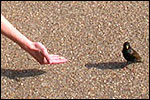 We now did what I had done every morning, for a week, in 1998: buy coffee and croissants at Starbucks, walk down Queensway, cross Bayswater Road, step through the gate into Kensington Park, and have that breakfast on a bench there, whilst enjoying the morning and the passing jogging and rollerskating girls. Wonderful, even though it wasn't summer like it was then, and there were less joggers and skaters because of it. This was amply compensated, by on the one hand a British tramp who turned out to have once lived in Lelystad with his parents, spoke fluent Dutch because of it and so (most refreshing) just had a chat with us when he noticed we were Dutchmen, instead of asking us for money or food, and by the birds on the other hand. We now did what I had done every morning, for a week, in 1998: buy coffee and croissants at Starbucks, walk down Queensway, cross Bayswater Road, step through the gate into Kensington Park, and have that breakfast on a bench there, whilst enjoying the morning and the passing jogging and rollerskating girls. Wonderful, even though it wasn't summer like it was then, and there were less joggers and skaters because of it. This was amply compensated, by on the one hand a British tramp who turned out to have once lived in Lelystad with his parents, spoke fluent Dutch because of it and so (most refreshing) just had a chat with us when he noticed we were Dutchmen, instead of asking us for money or food, and by the birds on the other hand.
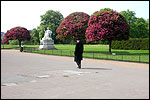 The birds that, once I made the mistake to try and feed a tiny bit of croissant to a pigeon of my choosing (I did succeed in this, by the by), threw themselves at our patch of park by the dozen. Pure Hitchcock. Crows and pigeons predominantly, but when the feeding stopped, they disappeared as swiftly as they came and, strange enough, some sparrows were all that remained. Of which de Gisser then got one to eat from his hand. Cute, and not the last animal moment we would have, this morning in Kensington Gardens, either. For when we, following this, had walked to the other side of the park, by Kensington Palace and the marble statue of Queen Victoria in front of it, made by her daughter Princess Louise, we there discovered, on a map of the park, at which we looked closely because we hadn't yet figured out whether we were in Hyde Park or not, that there was a statue of Peter Pan in this park. The birds that, once I made the mistake to try and feed a tiny bit of croissant to a pigeon of my choosing (I did succeed in this, by the by), threw themselves at our patch of park by the dozen. Pure Hitchcock. Crows and pigeons predominantly, but when the feeding stopped, they disappeared as swiftly as they came and, strange enough, some sparrows were all that remained. Of which de Gisser then got one to eat from his hand. Cute, and not the last animal moment we would have, this morning in Kensington Gardens, either. For when we, following this, had walked to the other side of the park, by Kensington Palace and the marble statue of Queen Victoria in front of it, made by her daughter Princess Louise, we there discovered, on a map of the park, at which we looked closely because we hadn't yet figured out whether we were in Hyde Park or not, that there was a statue of Peter Pan in this park.
This made something emotional dawn on me, and because, along the way there, there also was the Albert Memorial, which de Gisser was anxious to show me, we decided to make another round 'round the park in that direction. This then first brought us to that Albert Memorial, located opposite the Royal Albert Hall, on the other side of the road. And that is an almost gaudy, but really just gorgeous altar to the great British Empire that once was, a gilded Albert (spouse of Queen Victoria) in its centre, marble scenes from the respective four continents across which the Empire stretched (Europe, Asia, Africa and America) on its corners, and on the friezes around Albert's feet, reliefs of celebrities from agriculture, trade, engineering and manufacture. Yes, gorgeous, whatever you think of the Empire, but gaudy nonetheless. How different, then, that statue of Peter Pan. The emotional thing that dawned on me because of it, is 'Oh England my lionheart', a beautiful song from 'Lionheart', the album named after it by Kate Bush, in the lyrics of which this statue features (second verse, second line). I had never yet gathered that from it and only understood it once I was in front of that map here, and so this was an absolute reason for paying a visit to it, and taking a photo, alongside it. 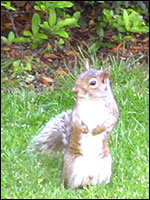 And then, while at the exit of the park, by Lancaster Gate tube station, de Gisser went for a piss and gave me his second, not yet eaten croissant for keeping, that second animal moment came. And that, of course, was the moment that incontrovertibly proved that, although in Kensington Gardens, we were definitely in Hyde Park. For there is no other place, in this world, where one can engage in deep and meaningful conversation with the noblest of all animal species: the British squirrel. I therefore did, and because this squirrel gave me free and good advice ("Do more with de Gisser"), I decided to feed it at least a quarter of de Gisser's remaining croissant out of gratitude. This also offered me the opportunity to make a picture of it, since unfed squirrels rarely sit still. And then, while at the exit of the park, by Lancaster Gate tube station, de Gisser went for a piss and gave me his second, not yet eaten croissant for keeping, that second animal moment came. And that, of course, was the moment that incontrovertibly proved that, although in Kensington Gardens, we were definitely in Hyde Park. For there is no other place, in this world, where one can engage in deep and meaningful conversation with the noblest of all animal species: the British squirrel. I therefore did, and because this squirrel gave me free and good advice ("Do more with de Gisser"), I decided to feed it at least a quarter of de Gisser's remaining croissant out of gratitude. This also offered me the opportunity to make a picture of it, since unfed squirrels rarely sit still.
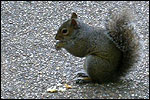 De Gisser himself naturally had some objections and, once finished pissing, muttered some things about rabies and rattishness. Of course, I paid no attention to this, but the squirrel's advice, this I followed with dedication. For although I had previously visited London some 27 times, I had, during those visits, mostly seen an endless repeat of the obligatory landmarks, like Buckingham Palace, St. Paul's Cathedral and the Tower of London, because I had almost always been there with others. No idea better, therefore, than to ask a former resident like de Gisser to take me to places I didn't yet know. And he not only did so the night before, with Camden and Russel Square, but repeated it today, with the Docklands Light Railway, and Greenwich. Do more with your local de Gisser, as you say, Sir Squirrel. De Gisser himself naturally had some objections and, once finished pissing, muttered some things about rabies and rattishness. Of course, I paid no attention to this, but the squirrel's advice, this I followed with dedication. For although I had previously visited London some 27 times, I had, during those visits, mostly seen an endless repeat of the obligatory landmarks, like Buckingham Palace, St. Paul's Cathedral and the Tower of London, because I had almost always been there with others. No idea better, therefore, than to ask a former resident like de Gisser to take me to places I didn't yet know. And he not only did so the night before, with Camden and Russel Square, but repeated it today, with the Docklands Light Railway, and Greenwich. Do more with your local de Gisser, as you say, Sir Squirrel.
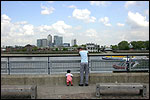 As we rode through it, we left the new architecture of Canary Wharf and surroundings for what it was (although it was worth the effort to have seen it, even if only this once), but we took a closer look around Greenwich. Following a stroll to the bank of the Thames, by the Cutty Sark, we had lunch in 'The Spanish Galleon Tavern' pub, a wonderful dark brown establishment with extremely friendly serving staff and a unprecedentedly extensive selection of filthy English foodstuffs. Great! And it had fine windows too, to look through, at the women in the street. Time to enjoy, over a steak & kidney pie, chips worked over with salt and vinegar, and green peas that never saw daylight. As we rode through it, we left the new architecture of Canary Wharf and surroundings for what it was (although it was worth the effort to have seen it, even if only this once), but we took a closer look around Greenwich. Following a stroll to the bank of the Thames, by the Cutty Sark, we had lunch in 'The Spanish Galleon Tavern' pub, a wonderful dark brown establishment with extremely friendly serving staff and a unprecedentedly extensive selection of filthy English foodstuffs. Great! And it had fine windows too, to look through, at the women in the street. Time to enjoy, over a steak & kidney pie, chips worked over with salt and vinegar, and green peas that never saw daylight.
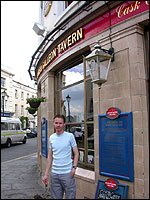 Rather rude of me, really, that, with so much enjoyment on offer, I had the nerve to ask the staff where Chatham was. And a good thing that the English, too, practice opportunist falsification of history; so that they didn't comprehend why I asked, and, somewhat puzzled, told me that it was "a very pleasant spot indeed" but that it was "miles away, in Kent". We therefore didn't go there, so this is a pilgrimage postponed, for me. For of course I must have been in Chatham before I die! It is, after all, the spot where the greatest of all naval heroes, whose name I bear, enriched the history of our country by breaking the chain across the river Thames and nicking the stern of the Royal Charles, so that we can admire it in Amsterdam's Rijksmuseum to this very day! Small wonder no Brit wants to know. Rather rude of me, really, that, with so much enjoyment on offer, I had the nerve to ask the staff where Chatham was. And a good thing that the English, too, practice opportunist falsification of history; so that they didn't comprehend why I asked, and, somewhat puzzled, told me that it was "a very pleasant spot indeed" but that it was "miles away, in Kent". We therefore didn't go there, so this is a pilgrimage postponed, for me. For of course I must have been in Chatham before I die! It is, after all, the spot where the greatest of all naval heroes, whose name I bear, enriched the history of our country by breaking the chain across the river Thames and nicking the stern of the Royal Charles, so that we can admire it in Amsterdam's Rijksmuseum to this very day! Small wonder no Brit wants to know.
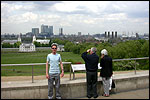 So anyway, we didn't go there. Instead, we visited the museum in the Royal Observatory, which to our joy offers free admittance these days. And this is a beautiful museum, about the origin of time- and place-determination, which moreover stands on the spot that is the heart of that time-determination: the prime meridian that is cause and controller of Greenwich Mean Time. But after I'd worked my way through this museum, quite a job for an alpha like myself, as it is full of numbers and maths, I didn't also feel like visiting the Maritime Museum, at the foot of the hill. So anyway, we didn't go there. Instead, we visited the museum in the Royal Observatory, which to our joy offers free admittance these days. And this is a beautiful museum, about the origin of time- and place-determination, which moreover stands on the spot that is the heart of that time-determination: the prime meridian that is cause and controller of Greenwich Mean Time. But after I'd worked my way through this museum, quite a job for an alpha like myself, as it is full of numbers and maths, I didn't also feel like visiting the Maritime Museum, at the foot of the hill.
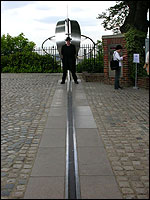 No, I was way too tired for that. Not
leastly because, due to work for the boss beforehand, I had already arrived in England dead tired. And so we spent the second half of the afternoon in much different fashion, but entirely in keeping with Wandelsoc. style: in the sun, on the grass of Greenwich Park, emptying a bottle of dubious wine, followed by a snoring nap on this most British of lawns. Pleasant, as this afternoon in Greenwich not only already was before (as, on our way to the Observatory, I entered a deserted haberdashery in order to buy some black thread for sowing my MESA-baton and parawing-pin to my new long coat, and in so doing unintentionally aroused the cute shop assistant who was there, and who had naturally never expected someone of my beauty to enter a premises normally only visited by old hags, and whose eyes therefore almost spontaneously popped out of their sockets as she used them to hungrily undress me), but continued to be. No, I was way too tired for that. Not
leastly because, due to work for the boss beforehand, I had already arrived in England dead tired. And so we spent the second half of the afternoon in much different fashion, but entirely in keeping with Wandelsoc. style: in the sun, on the grass of Greenwich Park, emptying a bottle of dubious wine, followed by a snoring nap on this most British of lawns. Pleasant, as this afternoon in Greenwich not only already was before (as, on our way to the Observatory, I entered a deserted haberdashery in order to buy some black thread for sowing my MESA-baton and parawing-pin to my new long coat, and in so doing unintentionally aroused the cute shop assistant who was there, and who had naturally never expected someone of my beauty to enter a premises normally only visited by old hags, and whose eyes therefore almost spontaneously popped out of their sockets as she used them to hungrily undress me), but continued to be.
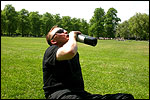 This despite the fact that the pub in which, on leaving the park, we landed, following some realization and on further consideration on our part, really did turn out to be a gay bar, in which we were therefore stared at no less hungrily and lecherously by strong men who at first looked very construction workerish. Even before the unsuspecting American father-daughter-tandem at the table next to us had latched on to this, we had already left again, after we had sat amazed at the hordes of uniformed schoolgirls exiting a school beyond our view, at the park's edge, while we downed our beer. This despite the fact that the pub in which, on leaving the park, we landed, following some realization and on further consideration on our part, really did turn out to be a gay bar, in which we were therefore stared at no less hungrily and lecherously by strong men who at first looked very construction workerish. Even before the unsuspecting American father-daughter-tandem at the table next to us had latched on to this, we had already left again, after we had sat amazed at the hordes of uniformed schoolgirls exiting a school beyond our view, at the park's edge, while we downed our beer.
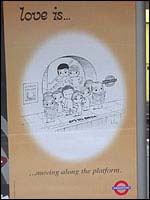 After that it was back to Bayswater, for collecting the luggage, by amongst other things a beautiful poster ('Love is... ...moving along the platform'), part of a broader campaign on Tube Etiquette. There was a better one yet, reading 'Love is... ...standing to the right on the escalator', but it passed so swiftly and unexpectedly, next to a moving escalator namely, that I didn't have the opportunity to snap it. Pity, pity, pity. I said it before in this piece: Holland can learn, at some points, from England. The trip back to the Hyde Park Inn passed swiftly and without trouble, and we also reclaimed our luggage without any trouble. But after that the fun was over. And then we became poor. For the train from London St. Pancras to Wellingborough, a 50 minute distance, for which we now bought tickets for both the trip there, as well as back, costs a bloody fortune. 33 rockhard British pounds, no less. Later, someone worked out for us that renting a car with two people for the weekend is cheaper than these train fares. Not that that would have helped, for neither de Gisser nor I have a driver's licence. After that it was back to Bayswater, for collecting the luggage, by amongst other things a beautiful poster ('Love is... ...moving along the platform'), part of a broader campaign on Tube Etiquette. There was a better one yet, reading 'Love is... ...standing to the right on the escalator', but it passed so swiftly and unexpectedly, next to a moving escalator namely, that I didn't have the opportunity to snap it. Pity, pity, pity. I said it before in this piece: Holland can learn, at some points, from England. The trip back to the Hyde Park Inn passed swiftly and without trouble, and we also reclaimed our luggage without any trouble. But after that the fun was over. And then we became poor. For the train from London St. Pancras to Wellingborough, a 50 minute distance, for which we now bought tickets for both the trip there, as well as back, costs a bloody fortune. 33 rockhard British pounds, no less. Later, someone worked out for us that renting a car with two people for the weekend is cheaper than these train fares. Not that that would have helped, for neither de Gisser nor I have a driver's licence.
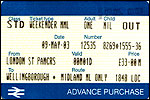 And so we were completely at the mercy of this trainride. Which, besides being ghastly expensive, was also a dumbfounding drama. For the reservation numbers of our seats, which only turned out to be necessary by the time we had already, with sweaty effort, hoisted our voluminous luggage into the packed car, turned out (we hadn't realized this before) to be scrawled onto the back of our tickets by the clerk, and to originally be correct, but by now, due to train-internal restructuring, all that had gone tits up. And so we were completely at the mercy of this trainride. Which, besides being ghastly expensive, was also a dumbfounding drama. For the reservation numbers of our seats, which only turned out to be necessary by the time we had already, with sweaty effort, hoisted our voluminous luggage into the packed car, turned out (we hadn't realized this before) to be scrawled onto the back of our tickets by the clerk, and to originally be correct, but by now, due to train-internal restructuring, all that had gone tits up.
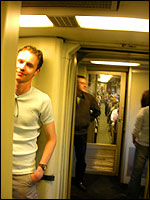 See, a train like this has a 'train manager'. And he had, for reasons that he did croak out through the intercom, but that up to now remain no less unclear to me, decided to swap the reservation numbers of our car with those of a car much further up the train (or actually, much further down the train, a distance that we had covered, in the opposite direction, on the platform). And so when we had finally found our original seats, there were other passengers on them who, being relatively unladen local residents, had had much less trouble getting in, had not missed the previous intercom-message in the train, like we had, and had therefore switched seats a long time ago. By now, of course, that train was rolling, and so not a hair on our head thought about tearing through four compartments of put out passengers, along a narrow aisle, bulky luggage and all, offending those travellers while accidentally hitting them over the heads. See, a train like this has a 'train manager'. And he had, for reasons that he did croak out through the intercom, but that up to now remain no less unclear to me, decided to swap the reservation numbers of our car with those of a car much further up the train (or actually, much further down the train, a distance that we had covered, in the opposite direction, on the platform). And so when we had finally found our original seats, there were other passengers on them who, being relatively unladen local residents, had had much less trouble getting in, had not missed the previous intercom-message in the train, like we had, and had therefore switched seats a long time ago. By now, of course, that train was rolling, and so not a hair on our head thought about tearing through four compartments of put out passengers, along a narrow aisle, bulky luggage and all, offending those travellers while accidentally hitting them over the heads.
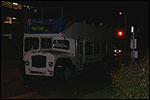 So by the time that de Gisser and I, having spent our trainride to Wellingborough standing, arrived at its station, we were already broken. This did not get any better when the shuttle bus from the station to the march's entry point, that the organizer's website had promised, was lacking, and the route description to it, given us by the ticket clerk at the station, left us in the lurch so much that, walking, we experienced a detour of at least 45 minutes before, having discovered a community centre full of linedancing locals in a godforsaken area, we were taken seriously enough, on account of my cowboy hat, to receive a route description to The Castle that wàs correct. Having arrived there, The Castle turned out not to be a castle at all, but a theatre in the city centre. Well and good. We were too late to enroll ("We've already closed, sir.") but did receive permission to both spend the night at Redwell Leisure Centre, and make use of the organized transport there, by open-top bus. So by the time that de Gisser and I, having spent our trainride to Wellingborough standing, arrived at its station, we were already broken. This did not get any better when the shuttle bus from the station to the march's entry point, that the organizer's website had promised, was lacking, and the route description to it, given us by the ticket clerk at the station, left us in the lurch so much that, walking, we experienced a detour of at least 45 minutes before, having discovered a community centre full of linedancing locals in a godforsaken area, we were taken seriously enough, on account of my cowboy hat, to receive a route description to The Castle that wàs correct. Having arrived there, The Castle turned out not to be a castle at all, but a theatre in the city centre. Well and good. We were too late to enroll ("We've already closed, sir.") but did receive permission to both spend the night at Redwell Leisure Centre, and make use of the organized transport there, by open-top bus.
This transport by open-top bus turned out to be good fun, for after a half hour's wait, in it, for its departure, we were surprised by a group of extremely noisy Dutchmen from the south of Holland who, in carnival mood, singing songs that Schelden undoubtedly all knows by heart, took their seats on that bus, having been boozing up in The Castle's bar. Pity that Schelden wasn't there, for they sang the entire ride long. And even better was that, just before that ride finally started, I suddenly stared, at a few centimetres' distance, into the face of Huib Bavelaar, transporter of all these southern Dutchmen, who had just got on. A reunion of stature, because of history past. And he wasn't even the only one, for once in the Redwell Leisure Centre there was Flip Koster too, who had most recently been my marching mate during the Four Days of the Yser. We therefore happily made our quarters, had some beers in 'The Waendel Arms', the community club-like bar of the Centre, took a refreshingly hot shower, and then fell asleep on the rockhard floor of the sports hall (there was a limited and already taken supply of mats). Day 3 - First day of marching 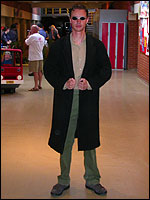 Hardens one, literally. And so we rose cursing, but cheerful, happy to have showered the night before, so that we could now make do with washing our faces, in the packed changing room, before we stepped out, towards the open-top bus and, waiting beside it, Clarence (he was a seriously heavyweight, utterly cross-eyed, but very friendly gentleman who voluntarily, for unpaid, played conductor on this shuttle line, and wasn't called that at all, but because of his squinting was swiftly christened so by some of our countrymen, after the lion on Daktari). De Gisser, by the way, did so in my old, museum worthy, long black coat - I had it to spare, after all, and he had forgotten his own coat. And so, inadvertently, we became 'The Blues Brothers', in popular marching speech, and 'The man in black' suddenly had a 'disciple'. The coat wasn't a luxury, by the way, for despite its being sunsplashed, it was a freshly cold morning, and this hits one hard, atop an open-top bus like this. Hardens one, literally. And so we rose cursing, but cheerful, happy to have showered the night before, so that we could now make do with washing our faces, in the packed changing room, before we stepped out, towards the open-top bus and, waiting beside it, Clarence (he was a seriously heavyweight, utterly cross-eyed, but very friendly gentleman who voluntarily, for unpaid, played conductor on this shuttle line, and wasn't called that at all, but because of his squinting was swiftly christened so by some of our countrymen, after the lion on Daktari). De Gisser, by the way, did so in my old, museum worthy, long black coat - I had it to spare, after all, and he had forgotten his own coat. And so, inadvertently, we became 'The Blues Brothers', in popular marching speech, and 'The man in black' suddenly had a 'disciple'. The coat wasn't a luxury, by the way, for despite its being sunsplashed, it was a freshly cold morning, and this hits one hard, atop an open-top bus like this.
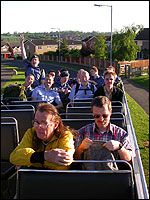 This was to hurt neither fun nor sociability, by the by (mind you, we were already very pleased, because of an extremely hefty English breakfast of eggs sunny-side up and bacon, fried bangers, white beans in tomato sauce, whitebread, croissant, orange juice and coffee-which-wasn't-even-instant-or-too-weak-but-percolated-and-reasonably-strong, all of it served by the utmostly friendly staff of the Waendel Arms), all the more so because this busroof was also populated by a London team of the Air Training Corps, people I always appreciate greatly, due to previous experience. One busride later, that wasn't only crazy because of this, but also because it was a hilly affair (and we were phoned during it, by Schelden), we were back at The Castle where, certainly when compared to the train prices of the day before, we enrolled in the march for an utterly reasonable amount of money. This was to hurt neither fun nor sociability, by the by (mind you, we were already very pleased, because of an extremely hefty English breakfast of eggs sunny-side up and bacon, fried bangers, white beans in tomato sauce, whitebread, croissant, orange juice and coffee-which-wasn't-even-instant-or-too-weak-but-percolated-and-reasonably-strong, all of it served by the utmostly friendly staff of the Waendel Arms), all the more so because this busroof was also populated by a London team of the Air Training Corps, people I always appreciate greatly, due to previous experience. One busride later, that wasn't only crazy because of this, but also because it was a hilly affair (and we were phoned during it, by Schelden), we were back at The Castle where, certainly when compared to the train prices of the day before, we enrolled in the march for an utterly reasonable amount of money.
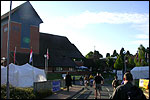 And then we finally started, but not before we had used a photo-opportunity with the incredible Ben Jeursen, radiantly present here with his new love, Marion Kooijers. And this is, whatever went before for both of them, definitely happiness that deserves a chance: I have seldom seen Jeursen this happy, and Marion, too, radiated happiness. Even the fact that Jeursen was beset by a sticky bomb (one of those characters you get along with very well in the beginning, but who then takes you for saviour and proceeds to follow you everywhere) could not do detriment to that, for him (and also, Ben is rude enough to just say so in that case, so this solves itself). And then we finally started, but not before we had used a photo-opportunity with the incredible Ben Jeursen, radiantly present here with his new love, Marion Kooijers. And this is, whatever went before for both of them, definitely happiness that deserves a chance: I have seldom seen Jeursen this happy, and Marion, too, radiated happiness. Even the fact that Jeursen was beset by a sticky bomb (one of those characters you get along with very well in the beginning, but who then takes you for saviour and proceeds to follow you everywhere) could not do detriment to that, for him (and also, Ben is rude enough to just say so in that case, so this solves itself).
And so, through parks and forest, we walked out of Wellingborough, and into the beautiful rolling hills of Northamptonshire. Now talking to other walkers, like Martine Segers and her mother, veterans of both walking and travelling with Bavelaar Enterprises, and Koen Straesser, who's been doing this march for years now and whom we ran into at both the first and second rest, then silently plodding along, de Gisser and I experienced this start of his first multiple day, international march. And we enjoyed it greatly: at a temperature of around 20 degrees Centegrade, under a cloudy sky from which, as yet, no rain came falling, the spring landscape, saturated with rapeseedy yellow, was a pleasant backdrop for the hell that would follow. 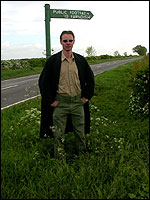 And which had to follow, of course. For although this march passes through a wonderful landscape, we are still, and even in fine weather, talking about a largely unpaved monster of 2x42 hilly kilometres. I can inform you that Diekirch pales in comparison, and really only the MESA is both comparable and heavier. Yet we could definitely count ourselves lucky, as pertaining to both that landscape (for it was dry and therefore not muddy) and the weather (a few light drizzles aside), and this would reflect itself in an almost total lack of injuries, always a relieving first-rate bit of profit. Apart from the landscape, by the by, this march also offers enough distraction because of the signs of human presence in it. A large part of the journey, for example, goes along gorgeous public footpaths, there sometimes are hilarious street signs (like the sign we came across shortly after the public footpath to Farndish, reading 'The Gap - formerly Park St.'; noone outside this country would think of that one as a text to be taken seriously) and the architecture and lay-out of the old English villages through which the walk leads, are a feast for the eye. Take, for instance, The Cuckoo public house, where the second rest was. And which had to follow, of course. For although this march passes through a wonderful landscape, we are still, and even in fine weather, talking about a largely unpaved monster of 2x42 hilly kilometres. I can inform you that Diekirch pales in comparison, and really only the MESA is both comparable and heavier. Yet we could definitely count ourselves lucky, as pertaining to both that landscape (for it was dry and therefore not muddy) and the weather (a few light drizzles aside), and this would reflect itself in an almost total lack of injuries, always a relieving first-rate bit of profit. Apart from the landscape, by the by, this march also offers enough distraction because of the signs of human presence in it. A large part of the journey, for example, goes along gorgeous public footpaths, there sometimes are hilarious street signs (like the sign we came across shortly after the public footpath to Farndish, reading 'The Gap - formerly Park St.'; noone outside this country would think of that one as a text to be taken seriously) and the architecture and lay-out of the old English villages through which the walk leads, are a feast for the eye. Take, for instance, The Cuckoo public house, where the second rest was.
Here, we experienced the biggest compliment that the Royal Dutch Federation for Physical Education (KNBLO), being the national marching organization (and so our country itself), can just about get, and that I, anyway, have ever seen: we came across a second ATC-team here, which also came from around Londen, and which, besides a Union Jack, carried a KNBLO-flag around. At this point I wasn't sure about this, although it did look a hell of a lot like it - but I would later verify this and receive confirmation. Well, ex-marchleader Bos of the Nijmegen Four Day Marches, you can pocket that one, for it is Your merit. We now, by the way, found out, whilst passing by a few more funny street signs ('Rotten Row' and 'Raymond Close', the latter particularly nice for Raymond de Gisser, of course) and through a few more gorgeous fields of rapeseed, what it is that makes this march absolutely unique: the obstacles along the way, that make the marcher become somewhat like a horse. Those obstacles namely come in the shape of 'stiles', these being typically English constructs to cross a fence by, which one only and exclusively comes across along the British public footpaths. And they are an absolute assault on the painfully stiff muscles, above 30 km. But they are great, just as great as the confirmation that I got outside the Half Moon pub, in which, of course, a contented Ben Jeursen sat drinking beer, that it indeed was a KNBLO-flag, that the ATC-team was carrying along. I got that confirmation from the team's leader, who spoke Dutch uncannily well (he opened the conversation with "Hoi, hoe gaat-ie?"), who then explained to me that it was the love of the Four Day Marches that had brought him to having this flag carried along during this practice for it, by his team. Fine moments, at home in foreign parts. 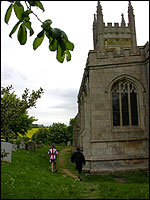 Shortly after leaving the Half Moon, and for the remainder of this marching day, Ray and I got company in the shape of Colin Hogarth. And this was a very pleasant acquaintance, which had, though, for me personally, started at an earlier stage. Colin, namely, is a phenomenon. He has marched all kinds of distances for years now, and almost always does so as a walking Union Jack (except when in the Irish Republic, by request of the organizers of The Castlebar, because it is a very sensitive matter in those parts). And this was how I had first met him in Diekirch, where I had applauded him the year before, as he walked across the bridge while finishing. He had, of course, thought this was strange behaviour on my part, and had found me a strange character anyway, because of my outfit, but by now he had received apt explanation, in the Half Moon, from Ben Jeursen, whom he already knew as a fellow marcher, and so Colin decided to strike up a conversation. Shortly after leaving the Half Moon, and for the remainder of this marching day, Ray and I got company in the shape of Colin Hogarth. And this was a very pleasant acquaintance, which had, though, for me personally, started at an earlier stage. Colin, namely, is a phenomenon. He has marched all kinds of distances for years now, and almost always does so as a walking Union Jack (except when in the Irish Republic, by request of the organizers of The Castlebar, because it is a very sensitive matter in those parts). And this was how I had first met him in Diekirch, where I had applauded him the year before, as he walked across the bridge while finishing. He had, of course, thought this was strange behaviour on my part, and had found me a strange character anyway, because of my outfit, but by now he had received apt explanation, in the Half Moon, from Ben Jeursen, whom he already knew as a fellow marcher, and so Colin decided to strike up a conversation.
This, as said, became a long and pleasant conversation, about matters ranging from mp3 versus the recording industry (I explained to Colin that, thanks to the existence of mp3 and Kazaa I had bought more cd's, rather than less of them), parachuting and the euro (Colin is an opponent) to the curious sights along the route, of which no tourist usually knows. Colin explained, for instance, how the thatched roofs that sparingly appeared are not just that, but also the autograph of the thatcher in question, because every thatcher producess a different and unique pattern along the top edge of a roof like that, and is therefore recognizable by it. And so he also told us that the red letterboxes, present in all English villages, can be dated by the code for the monarch that's on them: 'EIIR', for instance, means the letterbox was installed during the reign of Elizabeth II, the current Queen, but the code can also read 'GVIR' for the reign of King George VI, or even 'VR' for that of Victoria. Useful info, with which he entertained us so much that we didn't even notice what disastrous effect the beer we had had in the Half Moon had on our limbs. Somewhat saddening that, at the finish, we could not give him a taste of his own medicine and pay him back for the beer that he bought us in the Stag's Head, a pub in Great Doddington, just before the finish, because he immediately split from The Castle, with his wife, who was waiting there. We did see Mister Pläschke there (he's the German-Flemish-Dutch marching monster of whom I already spoke in the report on the previous march, in Bern), whom I had already run into earlier on, and got confirmation that his new girlfriend is, indeed, the MESA-heroine, just like Marco van Zijntergen had already surmised in Bern. And after we had obtained our last stamp on the daycard and had had some beer, we returned, by the bus that this time over came in a non-cabriolet version, to Redwell Leisure Centre, where we had a quick dinner of fine fish & chips and horrible kebab, showered and changed before returning by the same means, to The Castle, for the evening's entertainment. And that's when it really became fun. 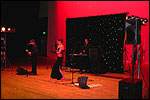 For inside, in The Castle's bar, my attention was immediately drawn by the most beautiful woman in the building: a slim blonde with a gorgeous head, and the kind of eyes that I would die for. This appeared to be of no use to me, since she was set upon by three very drunk Dutchmen, who behaved utmostly lecherous and lumpish towards her (their tongue was practically on their shoes, and the one closest to her couldn't keep his hands away from her for a second). I therefore left her for what she was and concentrated on my ale and Raymond de Gisser. For inside, in The Castle's bar, my attention was immediately drawn by the most beautiful woman in the building: a slim blonde with a gorgeous head, and the kind of eyes that I would die for. This appeared to be of no use to me, since she was set upon by three very drunk Dutchmen, who behaved utmostly lecherous and lumpish towards her (their tongue was practically on their shoes, and the one closest to her couldn't keep his hands away from her for a second). I therefore left her for what she was and concentrated on my ale and Raymond de Gisser.
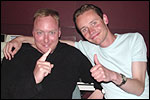 But when, out of boredom, a while later, we went to see and hear the party band, which by the way played very well, considering the circumstances (it was a party band), she herself made contact with me. "You're the man in black." "Yes, and you're the gorgeous blonde." It was to be an extremely pleasant conversation, with Helen Carr, officer of the London Metropolitan Police's vice squad. "Are you afraid of me now you know this?" "No, but I'd do anything you say." And more like that. A shame that, due to an appointment she'd made earlier on, and great hunger on her part, she took off around ten, to an Indian restaurant, in the company of those very same lumpish Dutchmen. But when, out of boredom, a while later, we went to see and hear the party band, which by the way played very well, considering the circumstances (it was a party band), she herself made contact with me. "You're the man in black." "Yes, and you're the gorgeous blonde." It was to be an extremely pleasant conversation, with Helen Carr, officer of the London Metropolitan Police's vice squad. "Are you afraid of me now you know this?" "No, but I'd do anything you say." And more like that. A shame that, due to an appointment she'd made earlier on, and great hunger on her part, she took off around ten, to an Indian restaurant, in the company of those very same lumpish Dutchmen.
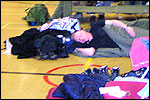 Not a hair on our head though, that, despite Helen's repeated invitation to, thought of coming along - because we were way too tired for that, but this would also irrevocably have led to fighting, with those punters. They namely insulted de Gisser immediately, in stupidly rude fashion (de Gisser had barely told Sian Lewis-Evans, Helen's friend, and a vice-cop too, that he is a security-guard, or those Dutch exclaimed to Helen, when she asked if de Gisser also carried a weapon, "Sure he's got a pistol! You want to see his pistol? It's probably very small!", pointing at his crotch), and were, as said and moreover, very cocky towards us, with respect to both Helen and her friend (whom de Gisser really liked, by the way, even though she was married - this was a good thing anyway, between de Gisser and me: we nicely turned out to go for different women all week long). Not a hair on our head though, that, despite Helen's repeated invitation to, thought of coming along - because we were way too tired for that, but this would also irrevocably have led to fighting, with those punters. They namely insulted de Gisser immediately, in stupidly rude fashion (de Gisser had barely told Sian Lewis-Evans, Helen's friend, and a vice-cop too, that he is a security-guard, or those Dutch exclaimed to Helen, when she asked if de Gisser also carried a weapon, "Sure he's got a pistol! You want to see his pistol? It's probably very small!", pointing at his crotch), and were, as said and moreover, very cocky towards us, with respect to both Helen and her friend (whom de Gisser really liked, by the way, even though she was married - this was a good thing anyway, between de Gisser and me: we nicely turned out to go for different women all week long).
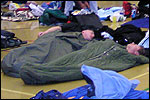 Oh well, so we returned to Redwell without the ladies, and there fell into a deep and contented sleep, which panned out a lot better anyway than that of the previous night, since we were much more worn now, for walking, and thus noticed the floor's hardness much less. Oh well, so we returned to Redwell without the ladies, and there fell into a deep and contented sleep, which panned out a lot better anyway than that of the previous night, since we were much more worn now, for walking, and thus noticed the floor's hardness much less.
Day 4 - Second day of marching The next marching day was better yet. Not just because of the weather, which would turn out to be warmer and drier, but certainly also because of the course and the landscape it led through. For had we, the day before, often still experienced nature in cultivated parkform, around city cenres, in suburbs and by industrial estates, today we ended up in the kind of English countryside that makes the mouths of travel brochure makers water. 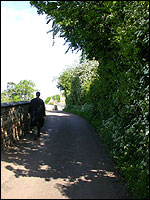 Rolling green hills, covered with hedgewisely carved up wild pastures, fitted with contentedly ruminating cows, sandstone villages in between, infested with hortensia and other broadly laid-out flowerbeds, eerily green short-clipped grass, rhododendrons, ancient churches and pubs, bright red letterboxes, and sometimes a likewise phonebooth. And with those stickers on cars reading 'Follow my lead - stick to the speed limit'. That's the kind of peace that really only exists in the countryside and which, today, made us realize fully that, in spite of the walking, we really were on holiday. Pleasant, pleasant, pleasant. Moreover, we were led across that landscape over unpaved paths, straight through fields, not only filled with rapeseed, but also with a green plant that looked like mutant grass, but had been identified, by Colin, the day before, as barley-at-an-early-stage. And barley is an important component of BEER, so those fields rapidly gained popularity, with de Gisser and me. And so even that walking almost became fun (but not really of course, for we are the Wandelsoc. after all, eh). Rolling green hills, covered with hedgewisely carved up wild pastures, fitted with contentedly ruminating cows, sandstone villages in between, infested with hortensia and other broadly laid-out flowerbeds, eerily green short-clipped grass, rhododendrons, ancient churches and pubs, bright red letterboxes, and sometimes a likewise phonebooth. And with those stickers on cars reading 'Follow my lead - stick to the speed limit'. That's the kind of peace that really only exists in the countryside and which, today, made us realize fully that, in spite of the walking, we really were on holiday. Pleasant, pleasant, pleasant. Moreover, we were led across that landscape over unpaved paths, straight through fields, not only filled with rapeseed, but also with a green plant that looked like mutant grass, but had been identified, by Colin, the day before, as barley-at-an-early-stage. And barley is an important component of BEER, so those fields rapidly gained popularity, with de Gisser and me. And so even that walking almost became fun (but not really of course, for we are the Wandelsoc. after all, eh).
Colin had, by the way, also explained to de Gisser and myself, during the previous day, what the story behind that rapeseed is. See, we had already known, since Bern, that its golden glow proves that spring has come around. But how it came to spread across England so relatively sudden, we didn't yet know. This, according to Colin, is because of the withdrawal of subsidies for the growing of potatoes and grain, because there is too much of that on a European scale. Then, farmers discovered that subsidies àre still given for the growing of rapeseed, that this is a cheap-to-grow crop in itself, because it is easy to sow and can be cultivated without the use of pesticides, and that, moreover, there is a market for it as pertaining to the oil produced from it. So that's why. And so, again according to Colin, the bizarre situation has come into being that England, by now, has to import grain and potatoes because it does not grow enough of the both anymore. "But it is nice to look at, this rapeseed." We wholeheartedly agreed. All the same, we were very annoyed at the indistinctnesses in the route description, which are the other item that makes this march unique: they give you a useless copied map with, next to it, a more useful, but sometimes unclear route description consisting of lines like 'Follow footpath around edge of field to gap in hedge with small bridge' and 'Left through hedge across field down hill through hedge to road'. Unclarity then arises if the signs-with-arrows, that are also put up along the course, appear to conflict with that description, or factually do, like they did on the hill we marched up on the edge of Sywell, just before the first rest of today. Had we combined arrows and route description in the obvious way, we would never have gotten to that rest, but would have walked in the entirely wrong direction, away from Sywell. Thankfully, we already knew that Sywell was where we needed to go and that this would therefore not be a good idea. 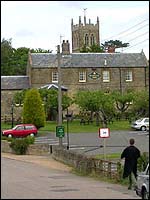 Well anyhow. Once past Sywell aerodrome (where we were called by Marco van Zijntergen, which was all the more nice because the conversation was embedded in the roar of taxiing turboprops, that makes our hair stand on end ever since the parachute jumping we did together), across a very heavy bit through the paddocks wrecked by horses' hooves, that had left large holes behind, because of which one had to be very careful here with one's ankles, so vulnerable after all, past another indistinctness on the map, that made the walkers inadvertently massively and bluntly march across a farmyard, towards the road beside it, which had been the original route intended, and just past the Overstone Arms, a beautifully situated and built pub, which we, however, did not visit, we moved into the pastures and caught up with Flip Koster, with whom we then ticked off a fine set of kilometres. This through a landscape that, from beautiful, became more so with, as the high point of this entire march, an ancient stone railway-bridge, from paddock to paddock. Bizarre but utterly pretty thing, which took us back to the nineteenth-century-we'd-never-been-in. And this, in all its poordom (that bridge would no longer have been there had it been Holland, and would have been replaced with a butt-ugly glass-and-metal monster), is also the charm of this England. Well anyhow. Once past Sywell aerodrome (where we were called by Marco van Zijntergen, which was all the more nice because the conversation was embedded in the roar of taxiing turboprops, that makes our hair stand on end ever since the parachute jumping we did together), across a very heavy bit through the paddocks wrecked by horses' hooves, that had left large holes behind, because of which one had to be very careful here with one's ankles, so vulnerable after all, past another indistinctness on the map, that made the walkers inadvertently massively and bluntly march across a farmyard, towards the road beside it, which had been the original route intended, and just past the Overstone Arms, a beautifully situated and built pub, which we, however, did not visit, we moved into the pastures and caught up with Flip Koster, with whom we then ticked off a fine set of kilometres. This through a landscape that, from beautiful, became more so with, as the high point of this entire march, an ancient stone railway-bridge, from paddock to paddock. Bizarre but utterly pretty thing, which took us back to the nineteenth-century-we'd-never-been-in. And this, in all its poordom (that bridge would no longer have been there had it been Holland, and would have been replaced with a butt-ugly glass-and-metal monster), is also the charm of this England.
Not to mention the fact that, where Cobraspen, as project developer, is unique in the Netherlands, in its attempts to preserve the character of city centres by maintaining old façades in front of completely new structures behind it, the Brits go about this, too, in a much less hypocritical and better way: namely by, when doing new construction next to old one, using the same old-fashioned materials that were used for the old structures, and sometimes even the procedures used at that time. 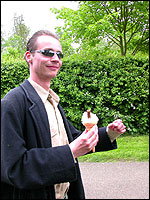 One pleasant icecream-cone further up (this was our second one, since Mr. Whippy, renowned chain of icecream-vans fitted with pricked-up, fake plastic, luminiscent icecream-cones - once accused, by me and my father, in the more southernly situated New Forest, of being in a sinister plot involving light signals passed from icecream-van to icecream-van by way of those fake cones - had already succesfully managed to shove two of them down our throats, chocolate flake and all), we then finally reached the city limit of Wellingborough, at the end of the day. And this, although we were at full steam here and gave almost everyone the slips, was most irritating, because it happened from the side of town where the Redwell Leisure Centre is, and we even had to move around and by it. Unpleasant, having to march past the shower, your clean clothes and your bed, knowing that you will first have to walk another five or so kilometres to the city centre before you can finish there, and will have to bus all the way back up before you'll see shower, clothes and bed again. One pleasant icecream-cone further up (this was our second one, since Mr. Whippy, renowned chain of icecream-vans fitted with pricked-up, fake plastic, luminiscent icecream-cones - once accused, by me and my father, in the more southernly situated New Forest, of being in a sinister plot involving light signals passed from icecream-van to icecream-van by way of those fake cones - had already succesfully managed to shove two of them down our throats, chocolate flake and all), we then finally reached the city limit of Wellingborough, at the end of the day. And this, although we were at full steam here and gave almost everyone the slips, was most irritating, because it happened from the side of town where the Redwell Leisure Centre is, and we even had to move around and by it. Unpleasant, having to march past the shower, your clean clothes and your bed, knowing that you will first have to walk another five or so kilometres to the city centre before you can finish there, and will have to bus all the way back up before you'll see shower, clothes and bed again.
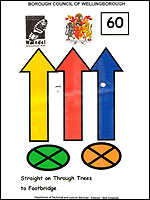 On this last bit, by the way, something else happened, that was at least as shocking. Along the hill, on the way down, there was a Community Centre, where kids were playing. Here, as I was waiting for de Gisser, who was busy extracting his last money from the automated teller on the wall of the adjacent supermarket, a small girl approached me, and asked me whether my Soc.-uniform had any political connotations. When I told her that it didn't, and that it was the outfit of a marching society, she said: "I thought you was a nazi". This in itself was not so shocking, since it happens to us more often. But it became somewhat disquieting when she looked at me incomprehensively, in reaction to my hearty laugh, denying head-nod and assurance that I voted Labour - she therefore did not understand that the one does not go together with the other. On this last bit, by the way, something else happened, that was at least as shocking. Along the hill, on the way down, there was a Community Centre, where kids were playing. Here, as I was waiting for de Gisser, who was busy extracting his last money from the automated teller on the wall of the adjacent supermarket, a small girl approached me, and asked me whether my Soc.-uniform had any political connotations. When I told her that it didn't, and that it was the outfit of a marching society, she said: "I thought you was a nazi". This in itself was not so shocking, since it happens to us more often. But it became somewhat disquieting when she looked at me incomprehensively, in reaction to my hearty laugh, denying head-nod and assurance that I voted Labour - she therefore did not understand that the one does not go together with the other.
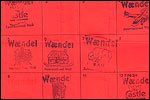 More disturbing, it became when a small boy joined her and asked me straightforwardly, and from the same line of thought, whether I'd come from Germany, and if I could take off my hat and sunglasses for him. And although that same boy urged that girl to behave when she continued to skip behind us, singing "Nazis, nazis, nazis", it was utterly clear to me that, in this neighbourhood, and in this matter, the kids were incompletely informed about the nature of things, to say the least. As if all nazis are German, as if, to their nazidom, it doesn't matter what their political views are, and as if all nazis themselves are Arians, as I happen to be by sheer coincidence. If this state of education is exemplary for Great Britain, I pity that country I love so much. More disturbing, it became when a small boy joined her and asked me straightforwardly, and from the same line of thought, whether I'd come from Germany, and if I could take off my hat and sunglasses for him. And although that same boy urged that girl to behave when she continued to skip behind us, singing "Nazis, nazis, nazis", it was utterly clear to me that, in this neighbourhood, and in this matter, the kids were incompletely informed about the nature of things, to say the least. As if all nazis are German, as if, to their nazidom, it doesn't matter what their political views are, and as if all nazis themselves are Arians, as I happen to be by sheer coincidence. If this state of education is exemplary for Great Britain, I pity that country I love so much.
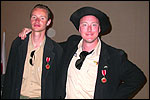 Anyway, down that hill, and the last stamp on our deepred daycard procured, we then finally were one fresh ribbon the richer. And a beautiful one it is, it must be said, not just because of its looks (there are two others, for the shorter distances, but the one of the 2x42 km is the prettiest beyond doubt), but also because of the effort made for it. Besides the medal, by the way, we also received a flashy certificate, on which the space for our own name was left open, so that I could, had I wished to, have made that thing read 'This is to certify that some other guy has succesfully completed...'. This, of course, to the hilarity of de Gisser and myself. Anyway, down that hill, and the last stamp on our deepred daycard procured, we then finally were one fresh ribbon the richer. And a beautiful one it is, it must be said, not just because of its looks (there are two others, for the shorter distances, but the one of the 2x42 km is the prettiest beyond doubt), but also because of the effort made for it. Besides the medal, by the way, we also received a flashy certificate, on which the space for our own name was left open, so that I could, had I wished to, have made that thing read 'This is to certify that some other guy has succesfully completed...'. This, of course, to the hilarity of de Gisser and myself.
In The Castle, where I bought three extra medals so I would be able to supply Fa. van Wielik in The Hague with ribbon-for-the-batons, and got me a stamp in my IML-passport, things then became festive, with Ben & Marion and, totally unexpected for us, Grietje Vissers and friend Janny Beishuizen, present here too! They, moreover, saved us by exchanging my prelast 50 euros for pounds, for we would have been poor suckers otherwise. Janny, also, was the proud recipient of an IML-award here (no idea which one, but I presume 'European walker'), out of the hands of, amongst others, the vice-president of the IML, so there was every reason for happy beerdrinking).  Which therefore took place, before we made preparations to return to the Leisure Centre. We drank without the policewomen, by the by, today. They had, the day before, done the long, 42 km bicycle-variety of the Wellingborough, and had been so wasted because of it that, I learned from mail I received upon my return home in Holland, they had eventually changed the intended switchback to the 25 km for today, into a total return home. Which they therewith accomplished a lot faster and easier than we did. For now, a drama began, the extent of which we could hardly expect yet, and which would last until Holland. But it didn't start there, as said: it started just outside The Castle, where the shuttlebus to Redwell Leisure Centre, which according to the timetable in and about it should have driven until 11 o' clock local time that night, turned out not to do so from 19:30 onward - so that we, in the company of two members of the cadre of groups that were part of Scouting Netherlands, who had landed in the same predicament, had to walk the last five kilometres of the march again, upward this time. Clarence left us in quite a lurch there. Which therefore took place, before we made preparations to return to the Leisure Centre. We drank without the policewomen, by the by, today. They had, the day before, done the long, 42 km bicycle-variety of the Wellingborough, and had been so wasted because of it that, I learned from mail I received upon my return home in Holland, they had eventually changed the intended switchback to the 25 km for today, into a total return home. Which they therewith accomplished a lot faster and easier than we did. For now, a drama began, the extent of which we could hardly expect yet, and which would last until Holland. But it didn't start there, as said: it started just outside The Castle, where the shuttlebus to Redwell Leisure Centre, which according to the timetable in and about it should have driven until 11 o' clock local time that night, turned out not to do so from 19:30 onward - so that we, in the company of two members of the cadre of groups that were part of Scouting Netherlands, who had landed in the same predicament, had to walk the last five kilometres of the march again, upward this time. Clarence left us in quite a lurch there.
Totally wasted, therefore, we decided to end the evening with another kilometre's worth of walking, to and from the pizzavendor, eating that pizza, drinking two beers, and falling over in the sports hall, which by now was a lot emptier and therefore thankfully much more restful. Day 5 - The trip back Refreshed after all then, we packed our belongings the next morning, and entered The Waendel Arms for the last English breakfast there. Which was a fine one again, so that we had every reason to be grateful towards the staff at the Leisure Centre, who made our stay a pleasant one right up to the last moment, and not just because of the food. Apart from the fact that they forgot to charge us the 4 quid a day that should have been paid for that food (a fact we would normally have deemed to be intolerably scandalous, but which we now, due to our great poverty, accepted with gratitude - nonetheless, we herebey promise this will be different should a next time ever come), they spent hours this morning, calling after the organization on our behalf, because, besides the shuttle-bus of the night before, it also forgot the promised one of this morning, to the Wellingborough railway station. The staff of the Arms even called replacement taxis for us, but they turned out not to be necessary in the end, because, finally, a lady of St. John Ambulance (which had provided the first aid-teams throughout the days of marching, too) appeared, with a minibus. Once back in London (we could seat ourselves this time, thankfully, on the train to St. Pancras, because we were forewarned, and there also were no seat-reservations whatsoever this time over, thankfully), the drama increased. We had namely, because of the unmanagability of our luggage, decided we would stow it in a locker at Luton Airport, since our train to London would go by there anyway. Wrong. In times of terrorism, the British government is a party to fear, which does not take half measures. So: all lockers gone, left luggage suspended until further notice (probably until the its fitted with proper scanners). So that, in the end, the only reason we took the shuttlebus from Luton Airport Parkway Railway Station to Luton Airport and back was for me to exchange my last 50 euros for pounds there. 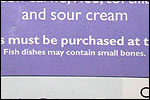 The spending of which then energetically got underway in Shakespeare's Head, an enormous pub, part of the J.D. Wetherspoon Pubs chain, after we had finally managed to lose our luggage in the left luggage office of St. Pancras Railway Station. In Shakespeare's Head the beerdrinking was pleasant, we had a great laugh over the splendid texts on the menu ('Fish dishes may contain small bones', this will lead to a great lyric yet, I'm telling you), and made some good conversation with two older gentlemen, whom we first thought to be pushy homosexuals, but who turned out just to be two friends at age, killing time before a planned visit to the British Museum. The spending of which then energetically got underway in Shakespeare's Head, an enormous pub, part of the J.D. Wetherspoon Pubs chain, after we had finally managed to lose our luggage in the left luggage office of St. Pancras Railway Station. In Shakespeare's Head the beerdrinking was pleasant, we had a great laugh over the splendid texts on the menu ('Fish dishes may contain small bones', this will lead to a great lyric yet, I'm telling you), and made some good conversation with two older gentlemen, whom we first thought to be pushy homosexuals, but who turned out just to be two friends at age, killing time before a planned visit to the British Museum.
The rest of our money, we then wasted in Funland, a mega-gamemachine-hall near Picadilly, where de Gisser in particular ate his heart out over the accumulated diversion (although I won the first double race, in the Daytona), on excellent coffee in the Manhattan off Russel Square, as we made one final pilgrimage to Raymond's old home, and on food in the Goose & Granite where, as I said at the beginning of this article, the serving was a lot less excellent today, but the Chicken Tikka Massala tasted great, and we also got stared at longingly by roguish girls. So all that was rather nice, but even that nicety was of a temporary kind. For now The Real Drama began. Once back at St. Pancras, namely, the 17:55 train to Luton Airport Parkway turned out to be cancelled. This appeared to be no problem since, mindful of previous lateness of trains, we had calculated times liberally beforehand. But upon inquiry, the next train to that station from St. Pancras turned out to only leave at 19:00, and as we were supposed to lift off at 19:30, that was not an option. So we let ourselves be redirected to King's Cross Thameslink Station, a ten minute walk from St. Pancras, from where earlier trains would leave for Luton Airport Parkway. 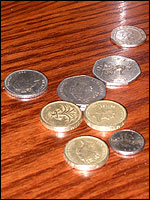 Emphasis on 'would'. Nothing farther from the truth, it turned out. It was rush hour by now, and the train we were supposed to catch became, with us on board too, laden so heavily that it broke down before departure. So everyone was asked to debark, in order to allow the train to be moved into a siding, in favour of a fresh train. This was a tricky affair, since the platform had by now filled up with travellers waiting for the train originally planned after ours. In the midst of the trouble that arose because of this ("Excuse me, I'm just trying to get out of the station..." "Well I'm just trying to get out of the country altogether" "Hey, that actually sounds better, can we join you?"), the station staff decided to close King's Cross Thameslink altogether and to ask everyone to leave the staion. This, of course, was just as impossible, so in the end that policy was abandoned too, and they finally succeeded in transporting the commuters away from there on 'regular' trains, in the second of which we eventually found ourselves, because we simply didn't fit in the former one anymore. Emphasis on 'would'. Nothing farther from the truth, it turned out. It was rush hour by now, and the train we were supposed to catch became, with us on board too, laden so heavily that it broke down before departure. So everyone was asked to debark, in order to allow the train to be moved into a siding, in favour of a fresh train. This was a tricky affair, since the platform had by now filled up with travellers waiting for the train originally planned after ours. In the midst of the trouble that arose because of this ("Excuse me, I'm just trying to get out of the station..." "Well I'm just trying to get out of the country altogether" "Hey, that actually sounds better, can we join you?"), the station staff decided to close King's Cross Thameslink altogether and to ask everyone to leave the staion. This, of course, was just as impossible, so in the end that policy was abandoned too, and they finally succeeded in transporting the commuters away from there on 'regular' trains, in the second of which we eventually found ourselves, because we simply didn't fit in the former one anymore.
Half an hour, plus a shuttle-busride of about ten minutes later, we were on the main concourse of Luton Airport - and had missed our flight to Amsterdam by five minutes, plus checkin time. Reason for great fear on our part, since by now we were totally broke, and we expected the transfer to a later flight to cost extra money. Thank God, this turned out not to be the case. But the next flight to Schiphol was to leave at six the next morning, checkin at 04:00 AM. 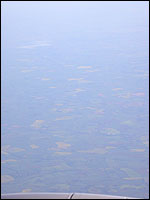 This then meant a waking night, spent on chairs, and in a sleeping bag on the floor in front of them, in Luton Airport's main hall, whilst entertaining ourselves, at times, by thinking of variants of Eminem's 'Slim Shady' (which had been our song of choice during the Waendelmarch too, tsjikka tsjikka). One would almost have trouble enjoying the vistas that the flight back, on a sunsplashed day, provided across England, over the Channel and of the Dutch coastline. But of course we did, for one is on that plane after all, and let's be honest, our friends of EasyJet were not to blame in the first place: Midland Mainline just isn't that party our national railways can learn from yet. This then meant a waking night, spent on chairs, and in a sleeping bag on the floor in front of them, in Luton Airport's main hall, whilst entertaining ourselves, at times, by thinking of variants of Eminem's 'Slim Shady' (which had been our song of choice during the Waendelmarch too, tsjikka tsjikka). One would almost have trouble enjoying the vistas that the flight back, on a sunsplashed day, provided across England, over the Channel and of the Dutch coastline. But of course we did, for one is on that plane after all, and let's be honest, our friends of EasyJet were not to blame in the first place: Midland Mainline just isn't that party our national railways can learn from yet.
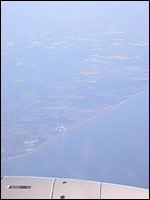 No, it's a clear story, when summarized, of which we must by the by state that we feel fortunate to have been through it and to thusly be able to recount it: the Wellingborough is a wonderful march, worth the walk and the trip to it, but it is a fucking expensive one. Considering the fact that, at this point in time, I estimate to have spent some €600 in total (of which I must, for honesty's sake, deduct €150 spent on that new coat), we can, for now, qualify this march as the most expensive one in our curriculum. The conclusion is twofold therefore: thankfully the next one will be cheaper - but maybe the season now underway will present us with an even more expensive one yet. We hold our breath, and await the things, that are yet to come. No, it's a clear story, when summarized, of which we must by the by state that we feel fortunate to have been through it and to thusly be able to recount it: the Wellingborough is a wonderful march, worth the walk and the trip to it, but it is a fucking expensive one. Considering the fact that, at this point in time, I estimate to have spent some €600 in total (of which I must, for honesty's sake, deduct €150 spent on that new coat), we can, for now, qualify this march as the most expensive one in our curriculum. The conclusion is twofold therefore: thankfully the next one will be cheaper - but maybe the season now underway will present us with an even more expensive one yet. We hold our breath, and await the things, that are yet to come.
To your health, Raymond, excellent walking there. Diekirch awaits. |
